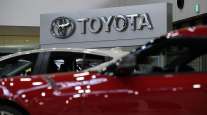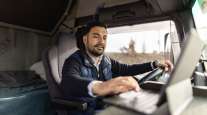Guarding Against Coronavirus

[Find the latest in trucking technology: Explore this quarter's issue of iTECH]
As trucking and logistics workers have returned to offices and terminals without masks — and perhaps with a pang of uncertainty — some workplaces have implemented technology and procedures to protect the health of their employees against the potential for new outbreaks and variants.
To support such efforts, some technology companies have introduced coronavirus monitoring systems powered by artificial intelligence. With those systems, businesses can issue each employee a Bluetooth-enabled ID badge, which they use to track and analyze each employee’s movements throughout the day and minimize their exposure to the virus.
Having such a solution enables Juniper Networks — both a maker of a coronavirus monitoring system and a user — to quickly zero in on where a coronavirus exposure occurs in the workplace and handle management of that potential exposure surgically.

Q2 iTECH
►Using Technology to Track Fuel Efficiency
►Clevenger: How AI Is Streamlining Freight Movement
►Canada's ELD Mandate
►Dysart: Guarding Against Coronavirus
►5 Questions: Daragh Mahon, Werner Enterprises
Explore the Issue!
“It allows us to quickly react,” said Brad Minnis, vice president of health safety and security and manager of the company’s ‘Juniper Mist’ AI-powered coronavirus monitoring system.
It “allows us also to limit the number of people that might be notified to those which are specifically at risk,” Minnis adds.
Not surprisingly, workers and executives in the trucking industry have mixed reactions to the idea of bringing in AI to closely monitor the movements of their employees in an effort to thwart coronavirus flare-ups.
Brandon Carroll Fulmer, a sales representative at Carroll Fulmer Logistics, says the company is open to the idea of using AI to monitor the virus, especially if his company found itself in the middle of another coronavirus outbreak.
“There is nothing we wouldn’t try in order to keep a bill of health for our loyal employees,” Fulmer said. “If something like this were immediately necessary in the future, we would be talking.”
Phil Wilt, president of American Central Transport, said his company already has a coronavirus monitoring system in place, although it’s a bit simpler than something powered by AI.
Essentially, American Central Transport requires workers to report on their general health each day to human resources — via text or email message — before they enter the workplace.
“Based off questions, we may send the employee for a COVID test, to the doctor, or ask them to come into the building if symptoms don’t align with COVID strains,” Wilt said. “We have been able to keep our work environments safe through our tracker and use of masks when county exposure numbers go up.”
Julia Benore, marketing manager at Benore Logistic Systems, said her company has put together a detailed worker protection program, which was painstakingly designed to safeguard employees from a coronavirus outbreak as much as possible.

ATA's Glen Kedzie and Transport Topics' Eric Miller dive into the realities and challenges of the proposed new NOx standard, what it means for truck manufacturers and for the industry's electric future. Tune in above or by going to RoadSigns.TTNews.com.
Specifically, Benore established one-way traffic patterns at the workplace, socially distanced workstations and office equipment as appropriate, required personal protective equipment where necessary and used signs to reinforce safe practices.
But so far, an AI monitoring system is not on the company’s radar, according to John Guardner, the company’s environment health and safety manager.
Other reactions to an AI monitoring system are in line with the sentiments of a significant number of Americans who are done with the coronavirus and simply want to get back to their lives.
“We think the worst is behind us,” said Jay McElroy, president of McElroy Truck Lines.
Holly McCormick, vice president for the talent office at Groendyke Transport, added: “I could see this type of AI system working, but my concern would be the costs associated with the product and/or software.”
For trucking companies interested in an AI-powered, systematic way of tracking coronavirus cases, the Juniper system is one of many available from a number of vendors that specialize in employee tracking at the workplace.
The Juniper system:
- Uses thermal imaging to quickly detect fevers in employees as they enter the building;
- Uses other sensors to detect other indications of coronavirus;
- Quickly sends messages via smartphone to employees who have been identified as potentially having coronavirus, or if they have been in close proximity to an employee with a confirmed case;
- Minimizes workplace disruptions by messaging only those employees who have been exposed to the virus — rather than attempting to ‘guess’ who might have been exposed to a coronavirus-infected employee;
- Quickly messages a cleaning crew to immediately sanitize a coronavirus-impacted area of the workplace;
- Verifies that all coronavirus mitigation technology linked to the AI monitoring system — including enhanced air filtration systems — is operating at maximum efficiency.
Besides offering peace of mind to employees, probably one of the great benefits of coronavirus workplace monitoring systems is that they enable a business to manage coronavirus exposure with surgical precision rather than blunt force.
In the early days of the pandemic, for example, businesses often shut down entire company campuses after the report of even a single case of coronavirus. Flying blind, companies had no way of definitely knowing how one person — suddenly exhibiting signs of COVID — interacted with other employees at the workplace, journeyed through the rooms and buildings of the business campus and made decisions on where to linger most.
But with a system such as Juniper’s, a company health and safety manager can immediately pull up a complete record of a coronavirus-impacted person’s journey through the workplace, identify exactly where they have been, and then issue an extremely precise health warning to only those employees who may have been exposed to the worker.
Yet another benefit: In many ways, software-based coronavirus monitoring systems are often future-proofed. More often than not, new coronavirus-sensing technologies can be hooked up to those systems as they’re invented.
Coronavirus researchers in Spain, for example, have come up with new prototype technology that can identify — with 90% accuracy — whether or not a person has COVID simply by the way they cough.
Besides serving as a relentless sentry on the virus, monitoring systems such as Juniper’s also offer health and safety managers the flexibility to adjust employee use of the workplace as coronavirus threats wax and wane.
During a lull in reported coronavirus cases, for example, a workplace conference room might host up to 100 employees for important meetings. But a health and safety manager may want to dial back the size of those congregations during high community transmission of coronavirus by alerting managers to limit meetings in those rooms to just 20 people.
Want more news? Listen to today's daily briefing above or go here for more info
Minnis said companies adopting workplace coronavirus monitoring will also most likely find that monitoring an entire workplace from one computer turns out to be a lot less expensive than some of the initial strategies used to get a handle on the virus.
Back in the early days of the pandemic, businesses sometimes resorted to posting numerous people at numerous locations throughout their business or company campus to keep an eye out for coronavirus trouble. Maintaining a team of those kinds of people can be very expensive.
In contrast, one person using a software/sensor-based coronavirus monitoring/alert system can — over time — be a much more cost-effective solution.
Of course, probably the biggest hurdle businesses will need to deal with when deciding to onboard an AI-powered coronavirus monitoring system is the privacy issue. At first blush, employees may like the idea of their company bringing in high-powered AI to safeguard their exposure to the coronavirus. But they may also be leery of the “Big Brother” feel of such a system — which monitors their every movement every second of their workday.
Systems such as Juniper’s assuage those privacy concerns in part by setting their software to anonymize the identities of all employees monitored — until there is a coronavirus detection and impacted personnel need to be immediately identified for their own safety.

Joe Dysart
“We are sensitive to both the individual’s privacy and trust — as well as our ability to manage and prevent the spread of infection for the safety of all our employees,” Minnis said.
When shopping for an AI-powered coronavirus monitoring system, Juniper’s Mist is a good one to use as a benchmark. But you’ll also want to take a look at other top employee location monitoring systems before making a final decision on a solution that’s right for you.
Market research firm Gartner released a report in February that identifies the following vendors as leaders in employee location monitoring: Zebra Technologies, Ubisense, Inpixon, Juniper Networks and AiRISTA.
Joe Dysart is an Internet speaker and business consultant based in Manhattan. Voice: (631) 438-1142. Email: joe@gurutechalert.com




